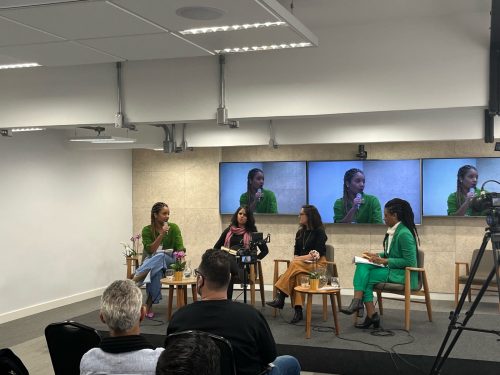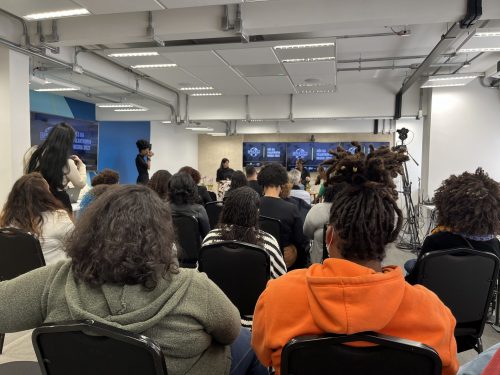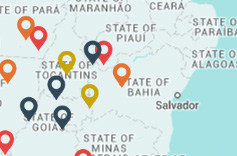
During the meeting, foundations make presentations on “Philanthropic practices for racial equity”. Photo: Mariana Rodrigues/Acervo Fundo Brasil
Last Tuesday, the 30th of August, Brazil Human Rights Fund participated in the meeting “Philanthropy and Racial Equity: challenges and ways of doing.” Specialists, institutes, and foundations that stand out in the debate on racial equity were invited by the Racial Equity Thematic Network, coordinated by the Group of Institutes, Foundations, and Companies (GIFE), to reflect on the importance of philanthropy and private social investment to foster and promote racial equity initiatives.
Mayana Nunes, the program officer for the Brazil Human Rights Fund, participated in the meeting, bringing the foundation’s 15-year experience in philanthropy for social justice and also fighting Racism.
“In our more than 15 years of activities, Brazil Fund has always addressed racial justice in its support programs. But in the last six years, we have done that specifically through the call for proposals Tackling Racism at the Grassroots Level, which is a call to support organizations led by black people, a key strategy for listening to and meeting the demands of grassroots groups led by black people.”
The event, which is part of Black Philanthropy Month (BPM), took place in the auditorium of Instituto Unibanco, São Paulo, and was broadcast on Zoom. The second Brazilian edition of BPM; this year’s theme was “Strength — The urgency of the now! From dreams to action”.
The debates were divided into three panels: Philanthropic Practices for Racial Equity, Affirmative actions in higher education and employability, and Democracy and racial equity intersections with economy, inequality, and development.
The moment was dedicated to exchanging knowledge, ways of doing, and practices that lead to possible paths for black philanthropy in the country.
Philanthropic practices for racial equity
In the first panel, alongside representatives of the Ford Foundation and the Ibirapitanga Institute, Mayana Nunes presented the grantmaking best practices. Brazil Fund’s way of transferring financial resources to civil society organizations in support of their causes so that they can develop their work in defense of rights in their diverse agendas.

Free event fills the auditorium of Instituto Unibanco in São Paulo. Photo: Mariana Rodrigues/Acervo Fundo Brasil
“We understand that grantmaking is our main strategy to strengthen organizations in the field of human rights based on the needs of each territory, especially on racial issues,” explains Mayana. “So, we have supported black women’s organizations, Terreiros, African matrix houses, and the debate about mass incarceration in Brazil since the black population in the peripheries is the main target of state violence and mass incarceration. We have also supported black youth, precarious workers, and quilombola territories. The programs and projects developed by these people and groups guarantee the resistance in the fight against racism”, she detailed.
Invited debaters were also asked about the role of foundations in supporting anti-racist groups during the Covid-19 pandemic. “During this period, we turned our attention to the institutional strengthening of human rights organizations and activists, understanding that there was a risk that organizations would not be able to guarantee their own continuity. Therefore, at the pandemic’s peak, we managed to contribute R$ 2.5 million to human rights defenders and other supported collectives through emergency funds to face the pandemic. But the pandemic is not over, and our support continues.”
Black Philanthropy Month:
Coordinated by GIFE, Black Philanthropy Month is held in Brazil in partnership with The WISE Fund. The movement began in the United States in 2011. Founded by Jacqueline Copeland from The WISE Fund, BPM’s main goal is to invest in concrete actions to include black people in society.
At the event’s opening, Cássio França, secretary-general of GIFE, spoke about the need for organizations to be united — from inside out — and across the country so that racial equity is effective in all sectors of society.
“We need to say, even though it’s pretty obvious, that it is no longer possible for organizations not to have a social balance. There needs to be diversity in this field. So, I invite you to continue with this form of activism, but it is also necessary to thrust the private social investment. This is one of Gife’s goals, but we know your part in the process is essential. Therefore, I thank you for your presence today”, highlighted Cláudio.
In addition to GIFE, the Racial Equity Thematic Network comprises Instituto Unibanco, Instituto Ibirapitanga, Fundação Tide Setubal, Itaú Social, Fundação Roberto Marinho, Open Society Foundation, and Ford Foundation.
Call for Proposals Tackling Racism at the Grassroots Level
Intending to guarantee resources for popular anti-racist groups and collectives led by black people, Brazil Human Rights Fund launched the call Tackling Racism at the Grassroots Level.
The total amount of R$ 1 million will be granted to at least 20 grassroots initiatives focused on defending the rights of the black population. Each group can receive up to R$ 50 thousand. The Warner/Blavatinik Social Justice Fund supports the call for proposals.
Since the beginning of the pandemic, Brazil Fund has understood the need to strengthen the existence and sustainability of the groups receiving support and facing various emergencies. Therefore, the resources of this call are flexible, which means that organizations can use them in the way they deem appropriate to ensure the sustainability of their activities to promote and defend human rights within the framework of combating Racism.
“I have great affection for this call. But, in addition to fieldwork, Brazil Fund has been increasingly committed to bringing racial diversity to our team, which is made up, for example, of 70% women and 50% black people. We understand that bringing diversity to the composition of our organization is a fundamental first step in the fight against Racism and for racial equity. We cannot support groups in the anti-racist struggle if these people are not also part of our decisions at the foundation”, emphasizes Mayana Nunes.







